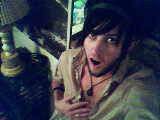- in frankenstein, victor's parents were extremely good to him, and he basically grew up as an only child until his sister came along. some of the poems most related to this text that influenced shelley were: "prometheus unbound," "rime of the ancient mariner," "alastor." in fact, the novel quotes coleridge's poem (the bird loved the mariner unconditionally, just like victor's mother). so, why did the mariner shoot the bird? why did people crucify jesus? —> divine love isn't always received, if you push it out of your life than its death cannot hurt you emotionally. having children changes your whole emotional outlook (if you push it away first, you save yourself the heartbreak)
-in "alastor," the main character travels all over the world (arabia, persia, kashmir on pgs. 252-254) and dreams of an arab maiden who he did not take notice of in person earlier. once he wakes up from this dream he realizes she was not real, she was a vision (dream girl). similarly, victor spurns nature's gifts in the process of creating his monster. victor used to get joy just from going outdoors before becoming obsessed w/ his monster project. he doesn't write his father or contact elizabeth during the creation stage of his monster (little to no human contact). he neglected nature and forget his friends
-part of his motivation to create the monster is to recreate his mother, or to prevent elizabeth from dying / hurting him (he's afraid of a world w/o her). from victor's perspective (pg. 40), he claims fate reached out and grabbed him (his passion being to create a new species), fate attacked him — here shelley accuses victor as being an innocent bystander when he should stand up for certain things. instead of trying to prove that he created a monster, he becomes passive and gives up attempting to save others for fear of being laughed at. on pg. 63 victor the egotist doesn't think about elizabeth's suffering. he has really failed in all aspects of his life, and one can fairly say that it is victor who is the true monster.


No comments:
Post a Comment